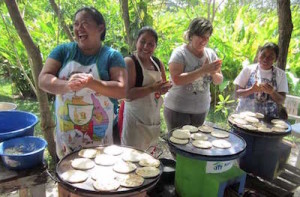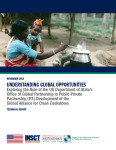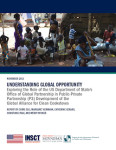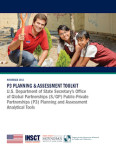“Understanding Global Opportunity” is the result of a 2014 grant to evaluate whether the US Department of State’s (DOS) Secretary’s Office of Global Partnerships (S/GP) achievement in establishing public-private partnerships—most notably the Global Alliance for Clean Cookstoves (GACC)—can serve as a model for other DOS international aid and development initiatives.
Background

It’s something of a cliché to say that government-run programs are overly bureaucratic, inefficient, and anything but innovative, yet nimble, cost-effective, and disruptive federal initiatives do exist—the challenge is to identify them, glean lessons from them, and use them as templates so that other programs can make the best use of limited resources.
In 2014, public policy experts from Syracuse University Institute for Security Policy and Law, the Moynihan Institute of Global Affairs, and the Program For the Advancement of Research on Conflict and Collaboration—housed at SU’s Maxwell School of Citizenship and Public Affairs and College of Law—were awarded a $160,000 grant to evaluate the people and processes used by the US Department of State’s (DOS) Secretary’s Office of Global Partnerships (S/GP) in establishing public-private partnerships (often called P3s). Specifically, the creation of the Global Alliance for Clean Cookstoves (GACC) was analyzed in a Technical Report and presentation.
The wider question was whether the S/GP model can serve as a template for other DOS international aid and development initiatives to advance US foreign policy objectives. Lessons learned from the GACC experience, as well as replicable evaluation methods, also were gathered in a Planning and Assessment Toolkit that accompanies the Technical Report.
Team Members
- Margaret Hermann, Director, Moynihan Institute of Global Affairs and Gerald B. and Daphna Cramer Professor of Global Affairs, SU Maxwell School of Citizenship and Public Affairs
- Professor Corri Zoli, Syracuse University
- Catherine M. Gerard, Associate Director of Executive Education Programs and Director of the Program for the Advancement of Research on Conflict and Collaboration (PARCC), SU Maxwell School
- Christiane Pagé, Research Associate and Ph.D. Candidate in Social Science, SU Maxwell School
- Wendy Wicker, Research Associate and Ph.D. Candidate in Social Science, SU Maxwell School
- Bruce Dayton, Director, Peacebuilding Program, and Associate Professor, Peacebuilding and Conflict Transformation, School for International Training Graduate Institute
About GACC
Championed by actor Julia Roberts, the Alliance’s Global Ambassador, GACC leverages public/private partnerships to support a global market for clean, efficient, sustainable, safe, and affordable household cooking fuels and technologies in developing nations. The alliance is calling for 100 million households to adopt clean and efficient cookstoves and fuels by 2020, to replace cooking methods that rely on unsustainable and dangerous fuels.
In 2013, GACC reported that 14.3 million clean stoves and 11.6 million kilos of clean fuel so far had been distributed in Bangladesh, China, Ghana, Guatemala, India, Kenya, Nepal, Nigeria, Uganda, and elsewhere. In addition, 75% of stove models had been tested to ensure health, safety, and sustainability standards, and the amount of revenue from the sale of stoves and fuel had grown, furthering the initiative’s push toward financial self-sustainment.
Evaluation Methods
In evaluating S/GP’s success with GACC, the SU report examines the role S/GP played in incubating, launching, and sustaining the Alliance from its days as a fledgling public/private partnership within the US Environmental Protection Agency to its formal launch into a fully independent, global P3 now housed within the United Nations Foundation.
The evaluation examines how S/GP built its GACC partnership base with attention to the private sector; how it maintained this collaborative partnership structure given challenges to it; and the ways it identified and sought to overcome barriers. The report also provides insights into definitions of success in using P3s in diplomacy and development in the foreign policy domain and the critical facilitating conditions that account for both positive and negative movement in state department efforts to stand-up collaborative partnerships.
The report concludes with a set of recommendations for future partnership development, especially important to S/GP as it now serves as the single entry point for global collaborations among the state department, the public and private sectors, and civil society.
The report urges S/GP to continue in its role as a catalyst of new ideas and as a convener and cultivator of partnerships and to foster a collaborative working relationship with non-governmental partners in which goals, structure, and governance are mutually determined; decision making, risks, and rewards are shared; working culture is flexible and disruptive; and openness, transparency, and accountability are expected.
Products
These publications are funded (in part) by a grant from the US Department of State (DOS). The opinions, findings, and conclusions stated therein are those of the author(s) and do not necessarily reflect those of the DOS.




